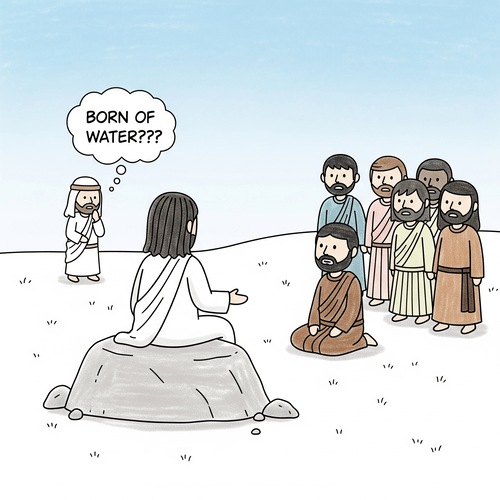Rewards in Heaven: Will They be the Same for Everyone?
The Heavenly Rewards Mystery
Will everyone allowed into heaven get the same “participation trophy”? Or does God have a more nuanced approach in store on eternal rewards? Buckle up, because we’re about to dive into one of the most intriguing and often overlooked teachings in the Bible: the concept of varying degrees of rewards in heaven.
Now, let’s be clear: entry into heaven is by God’s grace alone—through faith in Jesus Christ. That’s a ‘given’, a non-negotiable. However, once we’re there, could our earthly lives impact our heavenly experience?
Heavenly Rewards: Why Should We Care?
Before we jump in, let’s address the elephant in the room: Isn’t focusing on rewards a bit… selfish? Actually, it’s quite the opposite! Understanding God’s reward system can profoundly impact how we live our lives here on earth. It’s not about building a heavenly trophy case, but about aligning our hearts with what God values.
Biblical Evidence: More Than Just a Hunch
Will our rewards vary in heaven? Let’s look at what the Bible actually says about this:
- The Parable of the Talents (Matthew 25:14-30): Jesus tells a story of servants given different amounts of money to manage. Those who invested wisely heard, “Well done, good and faithful servant! You have been faithful with a few things; I will put you in charge of many things. Come and share your master’s happiness!” This suggests there will be varying levels of responsibility and reward in the kingdom.
- The Corinthian Construction Crew (1 Corinthians 3:12-15): Paul uses a building metaphor, saying our work will be tested by fire. Some will see their work burn up, “but they themselves will be saved, but only as through fire.” Others will receive a reward. This implies varying outcomes for believers.
- Storing Up Treasure (Matthew 6:20): Jesus encourages us to “store up for yourselves treasures in heaven.” This implies we have some agency in determining our eternal rewards: in other words, our choices and actions on Earth can influence the rewards we receive in heaven. This teaching suggests we can, through our faithful actions, decisions, and service to God and others during our earthly lives, accumulate for ourselves rewards in heaven.
- The Parable of the Minas (Luke 19:11-27): In this parable, Jesus tells a story of servants given equal amounts of money (minas) to invest. Those who invested wisely and produced more were rewarded with authority over cities, with the rewards varying based on their performance. This illustrates how our faithfulness and stewardship in this life may lead to different levels of responsibility or authority in God’s eternal kingdom.
- Daniel’s Prophecy (Daniel 12:3): This verse uses vivid imagery to describe the future state of the righteous. The comparison of the wise to the brightness of the heavens and those who lead others to righteousness to the stars suggests there may be different levels of glory or honour in eternity, possibly based on one’s wisdom and impact on others’ spiritual lives during our earthly existence.
Unpacking the Theology: Justice, Grace, and Motivation
Now, let’s wrestle with what all this means:
- It’s Not About Earning Salvation: Let’s be clear—salvation is a free gift through faith in Jesus Christ (Ephesians 2:8-9). Rewards are separate from salvation itself.
- God’s Perfect Justice: Varying rewards demonstrate God’s fairness. As Paul writes in 2 Corinthians 5:10, “For we must all appear before the judgment seat of Christ, so that each of us may receive what is due us for the things done while in the body, whether good or bad.”
- Motivation, Not Manipulation: Understanding rewards should inspire us to live faithfully, not out of fear, but out of love for God and a desire to please Him (2 Corinthians 5:9).
- Every Good Deed Counts: Jesus said even giving a cup of cold water to someone in His name won’t go unrewarded (Matthew 10:42). This encourages us that no act of service is too small in God’s eyes.
Living in Light of Eternal Rewards
So, how must this change our daily lives?
- We’re to Invest in Eternity: We shall do well to use our time, talents, and resources for things that have eternal value.
- We’re to Serve with Joy: We can be sure our acts of service, even when unnoticed by others, are seen and valued by God.
- We’re to Stay Humble: Also, let’s remember, any rewards we receive are ultimately because of God’s grace working through us (1 Corinthians 15:10).
Wrapping It Up: The Ultimate Motivation
So will our rewards vary in heaven? Scripture indicates they will. Understanding heavenly rewards, however, isn’t about creating a spiritual caste system or fostering competition. It’s about recognising God is a loving Father who delights in His children’s faithfulness. It’s a reminder to us how we live matters, not just for today, but for eternity.
The apostle Paul sums it up beautifully in Philippians 3:14: “I press on toward the goal to win the prize for which God has called me heavenward in Christ Jesus.” Friend, may each of us live with that same passionate pursuit of God’s best for our lives.
Related Reads:
Editor's Pick

Rethinking Sickle Cell Anaemia: A Case for Intelligent Design
Sickle cell anaemia presents what many consider evolution’s strongest card—a genetic condition that causes suffering yet provides protection against malaria. [...]

‘Bad’ Design: Flaw in Nature Or Flaw in Our Perspective?
When the Eiffel Tower was first proposed, critics called it a monstrous eyesore that would ruin Paris forever. Today, it’s [...]

The Problem of Divine Absence: How Do Believers Cope?
WHEN GOD SEEMS FAR: THE GREAT DISCONNECT Ever wondered why God seemed so close to Joseph in his Egyptian prison, [...]

Is ‘Gay Christian’ a Biblically Acceptable Identity to Have?
THE QUESTION OF IDENTITY IN BIBLICAL PERSPECTIVE The term “gay Christian” has become increasingly common in contemporary religious discourse, representing [...]

What Does ‘Born of Water’ in John 3:5 Mean?
THE REFORMED VIEW VS OTHER INTERPRETATIONS ”Jesus answered, ‘Truly, truly, I say to you, unless one is born of water [...]

The Lordship Salvation Controversy: What’s It All About?
Can someone be truly saved without making Jesus Christ their Lord? The question sits at the heart of one of [...]

1 John 5:6: How Do Water and Blood Reveal Jesus’ True Identity?
"This is he who came by water and blood—Jesus Christ; not by the water only but by the water and [...]

Is Jesus Yahweh? Answering Unitarian Objections
The question of whether Jesus Christ is truly God has divided Christians for centuries. While orthodox Christianity has consistently affirmed [...]

Matthew 3:11: What Is the Baptism of Fire?
When John the Baptist declared, “He will baptise you with the Holy Spirit and fire” (Matthew 3:11), his words carried [...]

From Rock to Stumbling Block: Why Jesus Called Peter Satan
In the span of just six verses (Matthew 16:13-28), Peter goes from receiving the highest praise from Jesus to getting [...]
SUPPORT US:
Feel the Holy Spirit's gentle nudge to partner with us?
Donate Online:
Account Name: TRUTHS TO DIE FOR FOUNDATION
Account Number: 10243565459
Bank IFSC: IDFB0043391
Bank Name: IDFC FIRST BANK






